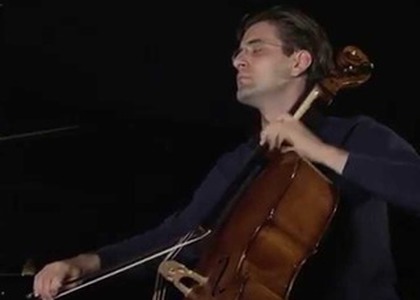> [Archived] Interviews

Interview with cellist Valentin Răduțiu (III)
March 4 - the first recital held in Bucharest by cellist Valentin Răduțiu, one of the best young musicians in the world. At the Sala Radio, a program supported by the Swedish pianist Per Rundberg, with which Răduțiu recorded the integral of the works for cello and piano by George Enescu. Tickets available here.
You are one of the most visible promoters of Romanian music from a discographic, but also internationally interpretive perspective, as well as Cristian Măcelaru, another remarkable musician who left Romania, but we can say that it does not necessarily represent the education system. here, being trained abroad and who, at the moment, does not forget that he is Romanian, of course. For you, what does it really mean, how consistent is this notion of being a Romanian, a Romanian interpreter?
We all unite because we are Romanian and because we sing music composed by Enescu ... It is, of course, a little more complex than that. There are very individual feelings that I think everyone feels at different times.
Sometimes I think that my nostalgia is a little exaggerated for my age (no 34 years old) ... to already feel so preoccupied sometimes with my roots, where I come from and where I go, but maybe the music means not only a a journey within a work, but also a journey inside your soul.
I think at a certain siritual level, whether it is the music we listen to, popular music for example ... Indeed, when I hear authentic traditional Romanian music I feel something I cannot say in words. There are memories, it is a parallel or my own realization of the course of my father for example. When I was 27-28 years old and I realized that this was the age my father left Romania and stayed in Germany and I imagined what it would be like, at that moment, to be left only with cello, diploma and 100 marks in another country and look for another future.
So, I think this aspect is complex and it is a permanent search through which we want to understand ourselves and reflect all the factors that determine us. As I often feel when my mother speaks from within me or my father speaks from within me, this is how I realize and when the Romanian speaks of me and I am sure that sometimes the German in me speaks. And now, when I try at the radio to better speak Romanian, I probably speak with a stronger accent than if you meet me for a beer after the concert. I am always happy to be able to share these thoughts, sometimes even more easily, but because they are very personal, with listeners and music lovers.
Translated by Oprea Ana Maria Adriana, Universitatea București,
Facultatea de Limbi și Literaturi Străine, MTTLC, anul I














